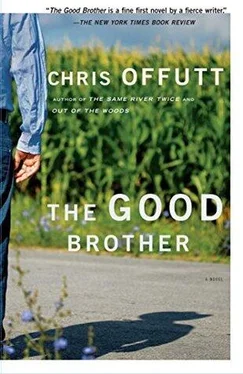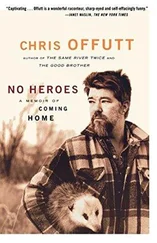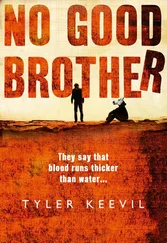“What about me?”
“You’re normal enough.”
“My mother taught me to shoot and my father taught me to cook.”
Joe watched the boys dig for a rock embedded in the hard dirt. Boyd had taught him more than his parents had.
Abilene was yelling for the stick Dallas was using to dig. Dallas pushed him, and Abilene hit his brother.
“You all shouldn’t fight,” Joe said. “Know what me and my brother did when we had to share?”
The boys shook their heads.
“We flipped for it. Got a penny?”
The boys shook their heads.
“Neither did we.”
Joe stooped for a flat rock. He spat on one side and smeared it with his thumb.
“Now you have to call it in the air. Dry or wet.”
He flipped the rock high. Dallas yelled “Wet,” and the rock landed with the dry side up, Joe found each of them a stone and returned to Botree. She looked at him carefully.
“I didn’t know you had a brother,” she said.
Joe turned away. The mountains were spiked with trees that would remain green throughout the fall. He missed the brilliant foliage of home. Autumn had been Boyd’s favorite season. Long after he’d quit hunting deer, he’d still tracked them every year, hoping to touch one in the woods.
In September the fires were deemed the worst in thirty years. Camping in parks was suspended, Missoula filled with evacuated families, off-duty firefighters, and emergency volunteers. The Red Cross set up temporary housing in school gymnasiums. Gerard and Phil were promoted to driver, and Joe worked alone. He lost weight from missing meals, and his leg ached from saying in one position while driving.
One morning Joe hauled cases of dried military food to a new base deep in the Flathead Valley. Each crate was stamped MRE. The slanting sun lit the Mission Mountains as if the rock walls held shards of glass. Deer cropped grass in a meadow of oxeye and balsam root. Joe followed a crude map to the first turn. A ladder of freshly dozed switchbacks climbed upslope to a new camp high in the mountains. From the summit, fire was visible in the west. It made arcing lines of orange along the slopes, forming a border of green trees and blackened earth. Aircraft circled overhead, carrying fire retardant and men.
A single tent stood beside a mess trailer and mini-dozer. Joe opened the truck’s rear gate and waited for a crew to help him unload the crates of food. He stood in the sun, wearing a down vest over flannel shirt and long johns. He was eager for the day to end. Tomorrow was Abilene’s birthday, and Joe had bought a board game that he and Boyd had played as kids.
Four young men approached the truck. Joe knew they were fresh recruits by the enthusiasm in their stride. These men hadn’t learned to hoard their energy for the fire. They seemed vaguely familiar and Joe wondered if they lived in the Bitterroot.
“Shit fire and save matches,” said a man. “Now we got to work.”
“All right, boys,” said another, “let’s knock this out fast and loaf.”
“Let’s not and say we did.”
“By God, he’s so lazy he’d not hit a lick at a snake.”
Joe recoiled from the raucous twang of their voices. He knew instantly where they were from. He turned to climb in the cab, but the men were upon him.
“What the hell’s in this truck anyhow?”
“Ever you boys see food that looked like that?”
“I’d not eat that to save me from Horn-head’s Hades.”
“Nothing’ll save you, son. You’re plumb wicked. Satan’s got a special room just waiting on you.”
“By God, it’ll be warmer than that damn tent. I’m sleeping in the middle tonight.”
“Will you give favors?”
“What do you mean?”
“Shoot, last night Bobby here gave us a little brown-eye, didn’t you, Bobby.”
“Shut up, you heathen.”
Joe hurried across the hard earth to the base commander, who was muttering into his radio. Joe waited until he finished. Strips of mist twined among the boughs of tamarack.
“Brought a load of food,” Joe said.
“We need it. Threw twenty men in the fire last night. They’ll be hungry tomorrow.”
“Anything special you’re needing?”
“Yeah. Rain.”
Joe made his voice flat.
“Where’s that new crew from?”
“Kentucky.”
Joe stood without blinking for nearly a minute. The pounding of his head moved across his shoulders and down his spine. In as casual a fashion as possible, he walked to the edge of the clearing and entered the woods. He watched the men unload the truck. They worked without talking, moving as a team. When they completed the task, they squatted on their heels to rest.
Joe walked to the truck, careful to keep it between him and the crew. He climbed in the passenger side, slid across the bench seat, and started the engine. Its steady rumble calmed him. From the open window came a voice.
“Hey, buddy. You ain’t got any water, do ye? Ain’t a one of us had a thing to drink.”
Joe passed a canteen to the man, who showed it to the crew behind him. Another man approached the truck. Joe thought he was staring, but couldn’t be certain.
“Keep it,” Joe said.
“Thank ye. We’re kindly new here. What about blankets and such?”
“I don’t know.”
Joe put the truck in gear too fast and stalled the engine. He fumbled with the key. The second man joined the crew boss. He was staring at Joe and frowning. Joe eased the truck into reverse. The second man spoke.
“Hey,” he said. “Hey, you.”
Joe revved the engine and lifted his foot from the clutch. The truck jerked backwards in a spray of dirt. The two men cursed and jumped away as Joe spun the truck in a lumbering circle. He forced it into first gear and sped down the dirt lane.
Joe yanked the wheel into the first switchback and clipped a pine, shattering the headlight. At the bottom he veered off the road and scared an elk that plunged into cover. Joe jerked the steering wheel and bumped back into the road ruts, his head striking the roof of the cab. When he reached blacktop he pulled over, his bad leg throbbing. Nausea passed through his bowels and he leaned his head outside until the sensation passed. He tried to calm himself. The man probably wanted to know how to get cigarettes. Joe had been surprised by the number of firefighters who smoked.
He wiped his face with his sleeve and drove back to the warehouse in Missoula. He’d become lax. He should have watched the billboard at the Incident Command Post for evidence of a crew from Kentucky. He wondered if he was in danger. The best move was to quit, but he liked the job. More important, he liked himself for having a fob. He thought of his father continuing to go into the mines after being diagnosed with emphysema. That decision had turned Boyd against work for life.
He parked in the lot and turned in his keys. The boss accepted Joe’s resignation without comment. He drove through town to the interstate. At the last red light he headed east through Hellgate Canyon, where pioneers had suffered ambush by the hundreds.
He followed the Clark Fork’s gentle meandering until it reached the juncture of Rock Creek. Traffic was slowed by campers and trucks pulling enormous trailers. An RV crept around a tight curve, the face of its driver tense. A tiny slip of the wrist and the whole contraption would plunge into the creek. Beyond the tourist lodge were fewer cars, and Joe felt as if he were going home again.
An expensive truck with. Nevada plates sat before his cabin. Fishing gear lay strewn about the soft earth like a yard sale. Joe backtracked to Ty’s place. No one answered his knock. A silken light sifted through the juniper boughs, imbuing the air with a golden glow. After several minutes Ty approached the Jeep from, behind, holding a rifle loosely in his hands.
Читать дальше












